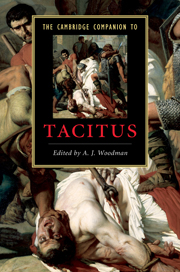Book contents
- Frontmatter
- Introduction
- Part I Contexts
- Part II Texts
- 3 The Agricola
- 4 The Germania as literary text
- 5 The faces of eloquence: the Dialogus de oratoribus
- 6 Fission and fusion: shifting Roman identities in the Histories
- 7 The Tiberian hexad
- 8 Hamlet without the prince? The Claudian Annals
- 9 ‘Is dying so very terrible?’ The Neronian Annals
- Part III Topics
- Part IV Transmission
- Chronological table
- Abbreviations and bibliography
- Index
5 - The faces of eloquence: the Dialogus de oratoribus
from Part II - Texts
Published online by Cambridge University Press: 28 March 2010
- Frontmatter
- Introduction
- Part I Contexts
- Part II Texts
- 3 The Agricola
- 4 The Germania as literary text
- 5 The faces of eloquence: the Dialogus de oratoribus
- 6 Fission and fusion: shifting Roman identities in the Histories
- 7 The Tiberian hexad
- 8 Hamlet without the prince? The Claudian Annals
- 9 ‘Is dying so very terrible?’ The Neronian Annals
- Part III Topics
- Part IV Transmission
- Chronological table
- Abbreviations and bibliography
- Index
Summary
Few live in a Golden Age. Fewer still ever know that they do. Even Cicero thought eloquence in short supply among his contemporaries, and complaints and regrets over oratory's diminishing quality mounted among his successors. The laments usually came embedded in a wider discourse of decline that tied oratory's downward trajectory to the indolence, greed and intellectual laxity of a grasping and complacent world: Romans were not inclined to fault their political system for the problem. Seneca the Elder, the first imperial author to address the question of decline, shrugs off a political explanation, and a century later the Greek author of the famous treatise On the Sublime flatly rejects what he calls 'that old cliché' that oratory flourishes with freedom and withers under tyranny. The cliché as he knew it derived from the Attic canon of orators, which implicitly identified great oratory with the death struggles of the independent polis, but the treatise reveals its Roman orientation by preferring a familiar Roman reason for oratory's plight, namely, undue love of wealth and pleasure. Romans of the first century AD may well have hesitated to follow the political thread of the argument to their emperor's door, but intimidation was not the only reason to hesitate. Those of a historical bent might conclude from the Republic's demise that not liberty but licence had nourished the eloquence of its oratorical Golden Age, and they might well prefer other measures of oratorical success.
- Type
- Chapter
- Information
- The Cambridge Companion to Tacitus , pp. 73 - 84Publisher: Cambridge University PressPrint publication year: 2010
- 2
- Cited by

